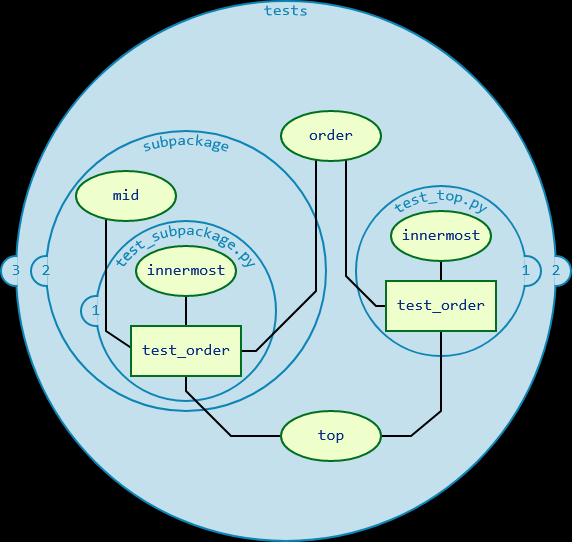Is this the correct use of conftest.py?
Yes it is. Fixtures are a potential and common use of conftest.py. The
fixtures that you will define will be shared among all tests in your test suite. However, defining fixtures in the root conftest.py might be useless and it would slow down testing if such fixtures are not used by all tests.
Does it have other uses?
Yes it does.
Fixtures: Define fixtures for static data used by tests. This data can be accessed by all tests in the suite unless specified otherwise. This could be data as well as helpers of modules which will be passed to all tests.
External plugin loading: conftest.py is used to import external plugins or modules. By defining the following global variable, pytest will load the module and make it available for its test. Plugins are generally files defined in your project or other modules which might be needed in your tests. You can also load a set of predefined plugins as explained here.
pytest_plugins = "someapp.someplugin"
Hooks: You can specify hooks such as setup and teardown methods and much more to improve your tests. For a set of available hooks, read Hooks link. Example:
def pytest_runtest_setup(item):
""" called before ``pytest_runtest_call(item). """
#do some stuff`
Test root path: This is a bit of a hidden feature. By defining conftest.py in your root path, you will have pytest recognizing your application modules without specifying PYTHONPATH. In the background, py.test modifies your sys.path by including all submodules which are found from the root path.
Can I have more than one conftest.py file?
Yes you can and it is strongly recommended if your test structure is somewhat complex. conftest.py files have directory scope. Therefore, creating targeted fixtures and helpers is good practice.
When would I want to do that? Examples will be appreciated.
Several cases could fit:
Creating a set of tools or hooks for a particular group of tests.
root/mod/conftest.py
def pytest_runtest_setup(item):
print("I am mod")
#do some stuff
test root/mod2/test.py will NOT produce "I am mod"
Loading a set of fixtures for some tests but not for others.
root/mod/conftest.py
@pytest.fixture()
def fixture():
return "some stuff"
root/mod2/conftest.py
@pytest.fixture()
def fixture():
return "some other stuff"
root/mod2/test.py
def test(fixture):
print(fixture)
Will print "some other stuff".
Overriding hooks inherited from the root conftest.py.
root/mod/conftest.py
def pytest_runtest_setup(item):
print("I am mod")
#do some stuff
root/conftest.py
def pytest_runtest_setup(item):
print("I am root")
#do some stuff
By running any test inside root/mod, only "I am mod" is printed.
You can read more about conftest.py here.
EDIT:
What if I need plain-old helper functions to be called from a number
of tests in different modules - will they be available to me if I put
them in a conftest.py? Or should I simply put them in a helpers.py
module and import and use it in my test modules?
You can use conftest.py to define your helpers. However, you should follow common practice. Helpers can be used as fixtures at least in pytest. For example in my tests I have a mock redis helper which I inject into my tests this way.
root/helper/redis/redis.py
@pytest.fixture
def mock_redis():
return MockRedis()
root/tests/stuff/conftest.py
pytest_plugin="helper.redis.redis"
root/tests/stuff/test.py
def test(mock_redis):
print(mock_redis.get('stuff'))
This will be a test module that you can freely import in your tests. NOTE that you could potentially name redis.py as conftest.py if your module redis contains more tests. However, that practice is discouraged because of ambiguity.
If you want to use conftest.py, you can simply put that helper in your root conftest.py and inject it when needed.
root/tests/conftest.py
@pytest.fixture
def mock_redis():
return MockRedis()
root/tests/stuff/test.py
def test(mock_redis):
print(mock_redis.get(stuff))
Another thing you can do is to write an installable plugin. In that case your helper can be written anywhere but it needs to define an entry point to be installed in your and other potential test frameworks. See this.
If you don't want to use fixtures, you could of course define a simple helper and just use the plain old import wherever it is needed.
root/tests/helper/redis.py
class MockRedis():
# stuff
root/tests/stuff/test.py
from helper.redis import MockRedis
def test():
print(MockRedis().get(stuff))
However, here you might have problems with the path since the module is not in a child folder of the test. You should be able to overcome this (not tested) by adding an __init__.py to your helper
root/tests/helper/init.py
from .redis import MockRedis
Or simply adding the helper module to your PYTHONPATH.


It seems great. However, I feel the documentation could be better.– Spinsterconftest.pyand although there are many references to doing this thing or doing that thing with a conftest file, nowhere in the documentation does it ever indicate that when pytest does test discovery, all conftest.py files found (within the directory strucutre over which test discovery is being done) will be run during the test collection phase (before any tests are run). Had to figure that out myself via experimentation. – Chris